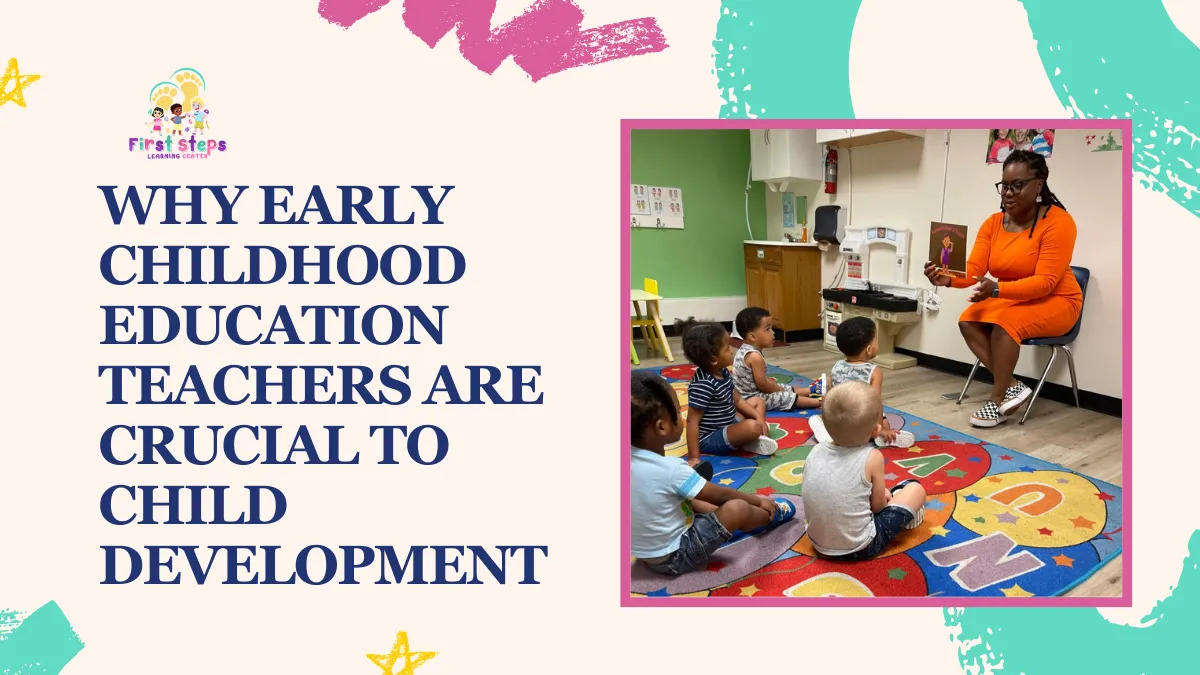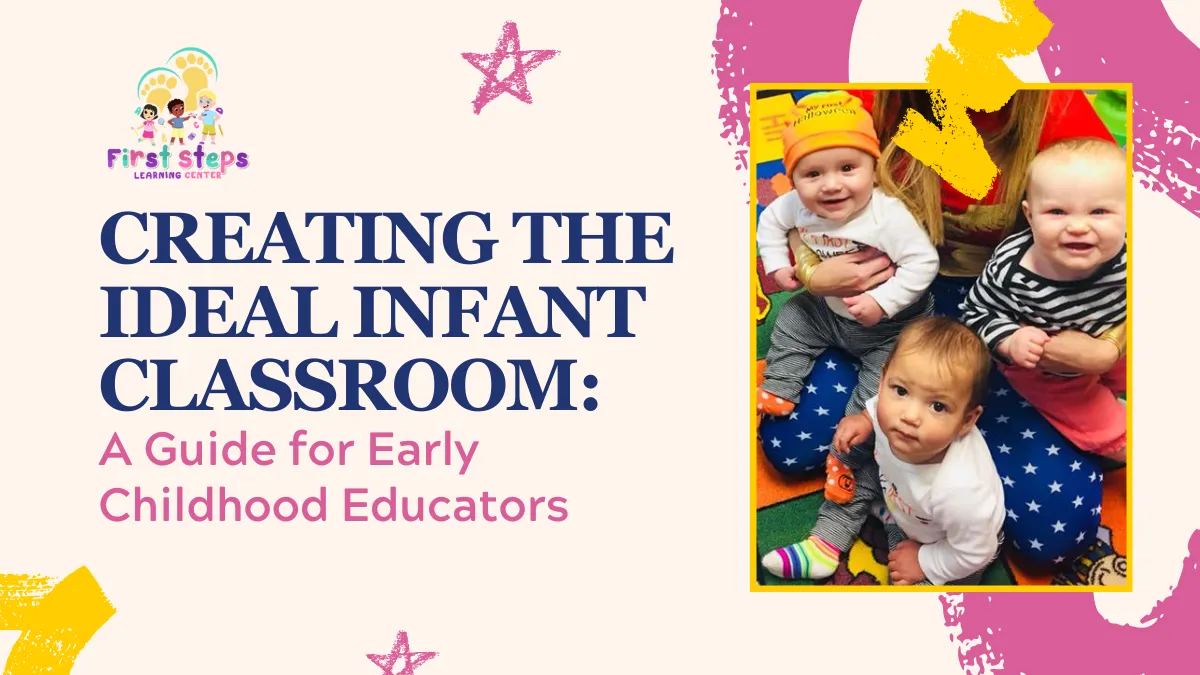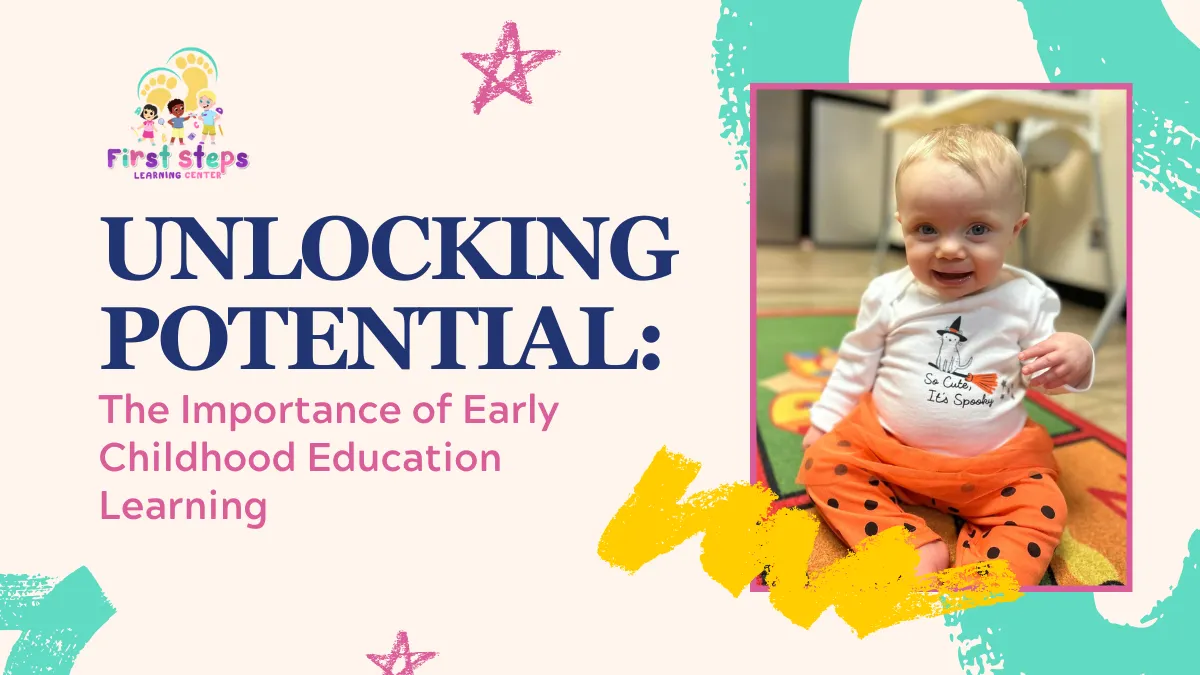Choosing the best infant daycare Houston offers is one of the most important decisions a parent can make during the early stages of a child’s development. High-quality infant care ensures your child’s safety and well-being and supports cognitive, emotional, and social growth in a structured environment.
With many options available across the Houston area, knowing what truly sets one center apart from another is essential. From safety protocols and staff qualifications to learning approaches and parent communication, each element plays a vital role in determining the finest fit for your family.
1. Look for Top-Rated Infant Care in Houston

Choosing a childcare provider for your infant begins with identifying top-rated infant care in Houston. A high-quality daycare facility prioritizes safety, early development, and a nurturing environment tailored to infants’ needs. Families should rely on multiple indicators to determine whether a provider meets or exceeds established standards.
Check Licensing and Accreditation
Begin by confirming that the daycare is licensed through the Texas Department of Family and Protective Services. Licensing confirms the facility complies with state safety, health, and caregiver qualifications regulations. Additional accreditation from nationally recognized organizations, such as the National Association for the Education of Young Children (NAEYC), signals an even higher commitment to quality standards.
Read Parent Reviews and Testimonials
Online reviews provide valuable insight into the daily operations of an infant care center. Look for consistent feedback related to:
- Staff professionalism and attentiveness
- Cleanliness and safety of the facility
- Communication with families
- Overall satisfaction and trust
Local parenting forums and community boards can also offer firsthand accounts and recommendations from families in similar situations.
Tour the Facility in Person
An in-person visit allows parents to observe the environment and ask detailed questions. During a tour, assess:
- Cleanliness and organization of infant care spaces
- Security measures, such as controlled entry and camera monitoring
- Staff interaction with infants and responsiveness to needs
These observations provide a clearer understanding of the care environment beyond what is presented online.
2. Prioritize a Safe and Nurturing Daycare for Babies
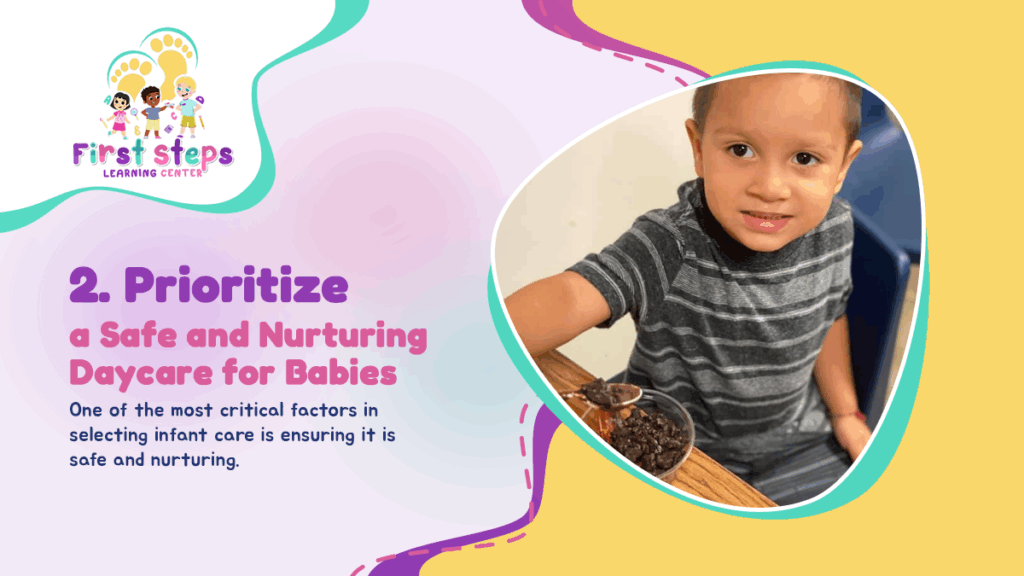
One of the most critical factors in selecting infant care is ensuring it is safe and nurturing. Infants require constant supervision, a calm atmosphere, and attentive caregivers to their physical and emotional needs. Parents should evaluate how well a daycare supports these priorities before making a decision.
Examine Health and Safety Standards
Safety is the foundation of quality infant care. A reputable daycare should maintain the following:
- Secure entry systems and controlled access
- Clean, sanitized spaces and equipment
- Emergency preparedness plans and first aid trained staff
- Clearly documented diapering, feeding, and hygiene procedures
These standards help prevent illness and injury while ensuring infants are cared for in a healthy environment.
Observe the Emotional Environment
A nurturing atmosphere supports an infant’s social and emotional development. Look for signs that the center prioritizes comfort, bonding, and responsiveness, including:
- Gentle interactions between staff and infants
- Soothing tones, soft lighting, and calm routines
- Consistent caregivers who form secure attachments with children
Infants thrive when they feel safe, loved, and understood. A daycare that fosters this type of environment contributes positively to early development.
Confirm Individualized Care Practices
Infants have unique feeding, sleeping, and activity schedules. A quality daycare should offer individualized care plans that align with family preferences and the child’s needs. Ask how the center handles:
- Personalized feeding times (breast milk, formula, solids)
- Nap routines and sleep environment
- Communication with parents about changes in behavior or development
Choosing a safe and nurturing daycare for babies means finding a provider that equally values security and emotional care. When these standards are met, families can trust that their infants are in capable, compassionate hands throughout the day.
3. Know When and How to Enroll in the Best Infant Daycare Today
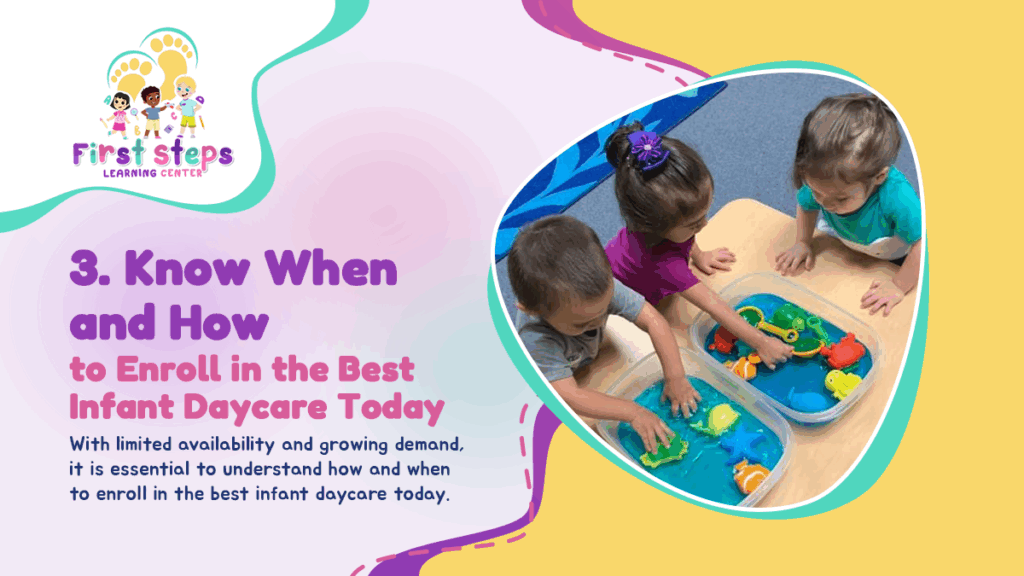
With limited availability and growing demand, it is essential to understand how and when to enroll in the best infant daycare today. Early preparation and proactive communication are vital in securing a space at a reputable center that meets your family’s needs. Knowing the enrollment process helps ensure a smooth transition into care and minimizes potential delays.
Start the Search Early
High-quality infant daycares in Houston often have waitlists, especially for children under 12 months. Families are encouraged to begin researching and touring facilities during pregnancy or several months in advance. Early inquiries give parents a better chance of:
- Reserving a spot in a preferred program
- Aligning the start date with parental leave or work schedules
- Completing all required paperwork without time constraints
Planning increases the likelihood of finding a center that aligns with both availability and preferences.
Understand the Application Process
Each daycare center has its own enrollment procedures. Generally, parents should be prepared to:
- Complete an application form
- Submit medical and immunization records
- Provide documentation such as emergency contact information and feeding instructions
- Pay a registration or waitlist fee (if applicable)
Understanding these steps in advance allows families to gather the necessary materials quickly.
Confirm Admission Policies and Enrollment Requirements
Before finalizing enrollment, clarify the center’s policies regarding:
- Minimum age for admission
- Daily schedule and hours of operation
- Tuition rates, payment schedules, and refund policies
- Required orientation or transition visits
Knowing how to enroll in the best infant daycare today empowers parents to act quickly and confidently when an opening becomes available. A clear understanding of timelines, requirements, and expectations ensures that the childcare experience begins on a positive, well-prepared note.
4. Evaluate Staff Qualifications and Infant-to-Caregiver Ratios
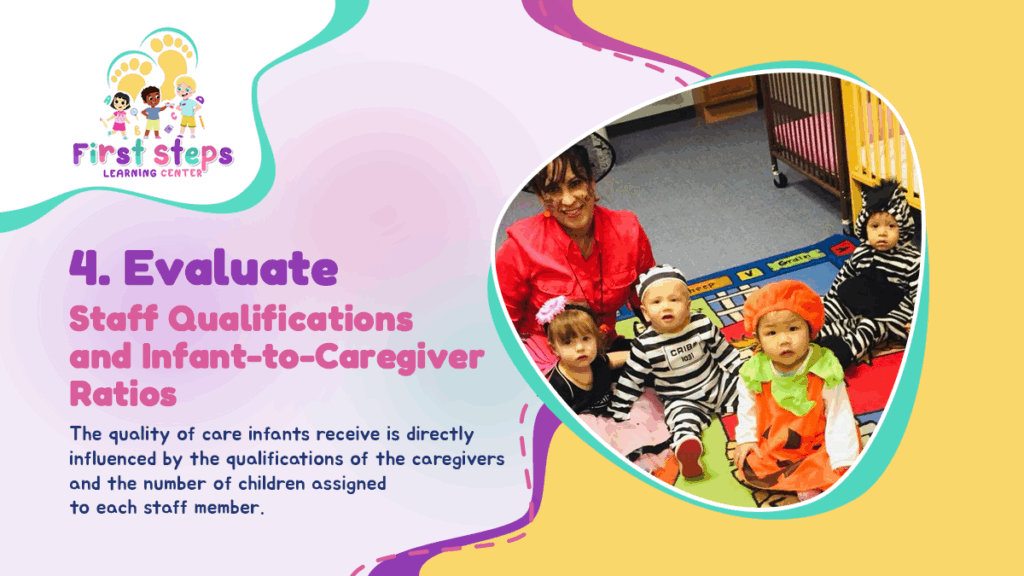
The quality of care infants receive is directly influenced by the qualifications of the caregivers and the number of children assigned to each staff member. Families should prioritize centers that employ highly trained professionals and maintain developmentally appropriate infant-to-caregiver ratios to ensure attentive, personalized care when selecting infant daycare.
Review Staff Credentials and Training
Qualified infant caregivers should possess a solid foundation in early childhood education, with specialized knowledge in infant development. Parents should ask about:
- Degrees or certifications in early childhood education
- Infant CPR and first aid training
- Ongoing professional development or staff training programs
- Experience specifically in infant care
Well-trained staff members are better equipped to respond to infants’ unique physical, emotional, and developmental needs.
Confirm Low Infant-to-Caregiver Ratios
A low ratio ensures that each infant receives the required attention and supervision. Texas’s state-mandated infant-to-caregiver ratio is 4:1 for children under 12 months. High-quality centers often aim for even lower ratios to promote closer interaction and bonding. Benefits of low ratios include:
- Prompt responses to crying, feeding cues, and diapering needs
- Increased safety and supervision
- More opportunities for one-on-one developmental support
Parents should verify that the center consistently maintains ratio compliance throughout the day, including during transitions and staff breaks.
Observe Interactions Between Staff and Infants
Families should watch how caregivers engage with children during a visit or tour. Positive signs include:
- Eye contact and verbal communication with infants
- Gentle, nurturing physical touch and calm demeanor
- Staff who are attentive and responsive to each child’s needs
By carefully evaluating staff qualifications and infant-to-caregiver ratios, families can ensure their child will be in a safe, supportive, and professionally managed environment that fosters healthy growth and development.
5. Review Daily Routines, Feeding, and Sleep Schedules
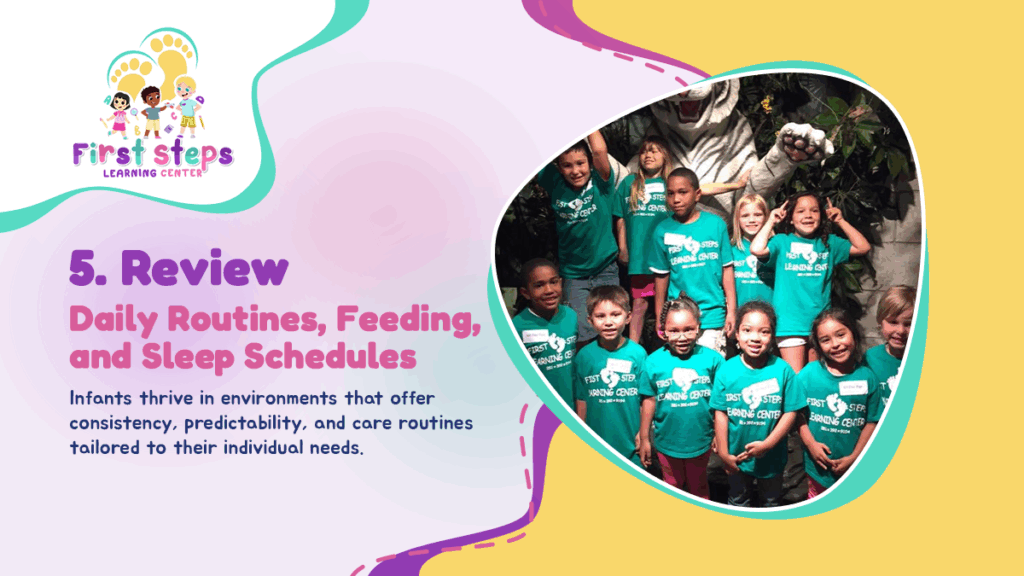
Infants thrive in environments that offer consistency, predictability, and care routines tailored to their individual needs. When evaluating daycare options, parents should closely examine how each center structures daily routines, feeding, and sleep schedules to support their child’s physical and emotional well-being.
Understand the Structure of the Day
Even at an early age, infants benefit from a gentle structure that includes a balance of care routines and age-appropriate stimulation. A well-organized daycare should offer:
- Predictable routines for feeding, diapering, naps, and play
- Calming transitions between activities to reduce stress
- A nurturing environment that allows flexibility based on each child’s cues
A steady routine fosters a sense of security and helps infants adjust to being away from home.
Review Feeding Practices and Policies
Feeding is one of the most critical aspects of infant care. Parents should ensure the center’s practices align with their preferences and the child’s needs. Key areas to inquire about include:
- Accommodations for breast milk, formula, or early solids
- Individualized feeding schedules based on the child’s routine
- Sanitation procedures for bottles, utensils, and feeding areas
- Documentation of feeding times and amounts for parent reference
Clear communication between staff and families ensures infants are fed safely and appropriately.
Evaluate Nap Schedules and Sleep Environment
Rest is essential for infant development. Quality daycare centers should provide a safe, quiet, and comfortable sleep environment. Parents should check that the center:
- Follows safe sleep practices recommended by the American Academy of Pediatrics (e.g., placing infants on their backs to sleep)
- Provides individual cribs for each child
- Maintains a calm, dimly lit sleep area
- Respects the infant’s natural sleep patterns
By reviewing how a daycare manages daily routines, feeding, and naps, parents can ensure their child will receive attentive, personalized care that supports healthy growth and development throughout the day.
6. Assess Parent Communication and Ongoing Support
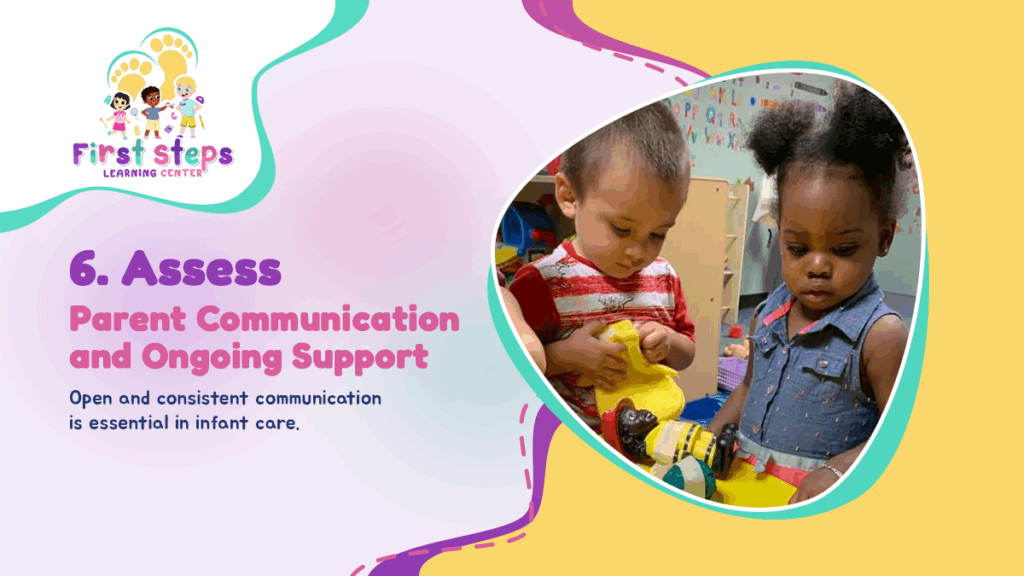
Open and consistent communication is essential in infant care. Parents should feel informed, supported, and confident that their child’s needs are being met throughout the day. When choosing an infant daycare, it is important to assess parent communication and ongoing support as part of the overall quality of care.
Review Daily Reporting Practices
Reliable daycare centers provide daily updates that keep families informed about their child’s routines, moods, and milestones. These reports may include:
- Feeding and nap times
- Diaper changes
- Notable behaviors or developmental progress
- Any concerns or changes in the routine
Some centers use paper logs, while others offer digital updates through secure apps or platforms. Daily communication ensures transparency and fosters trust between parents and caregivers.
Inquire About Parent-Caregiver Interaction
A strong relationship between parents and caregivers supports the child’s development and emotional well-being. Look for centers that:
- Schedule regular opportunities for parent check-ins
- Encourage open dialogue about child progress or concerns
- Maintain a welcoming environment for family involvement
Consistent communication strengthens collaboration and helps caregivers tailor care to each child’s evolving needs.
Understand How Progress and Development Are Tracked
Ongoing support includes monitoring developmental milestones and sharing observations with families. Ask how the daycare is:
- Tracks infant growth, motor skills, and early learning behaviors
- Provides feedback on social and emotional development
- Offers parent-teacher conferences or progress reviews
Centers that monitor development help parents stay engaged in their child’s early learning journey and identify needs for additional support when necessary.
Conclusion
Choosing the best infant daycare in Houston is a meaningful step in giving your child a safe, enriching start to life. By focusing on key factors—such as quality of care, safety, daily routines, staff qualifications, and parent communication—you can feel confident selecting a center that nurtures your baby’s growth and well-being. Evaluating each of these areas ensures your child will be supported in a warm, attentive environment that promotes early development and peace of mind for your family.
Ready to give your child the best start? Contact First Steps Learning Center at 281-392-9194 to schedule a tour or talk to our team about infant care availability. Let us be part of your baby’s first steps forward.


